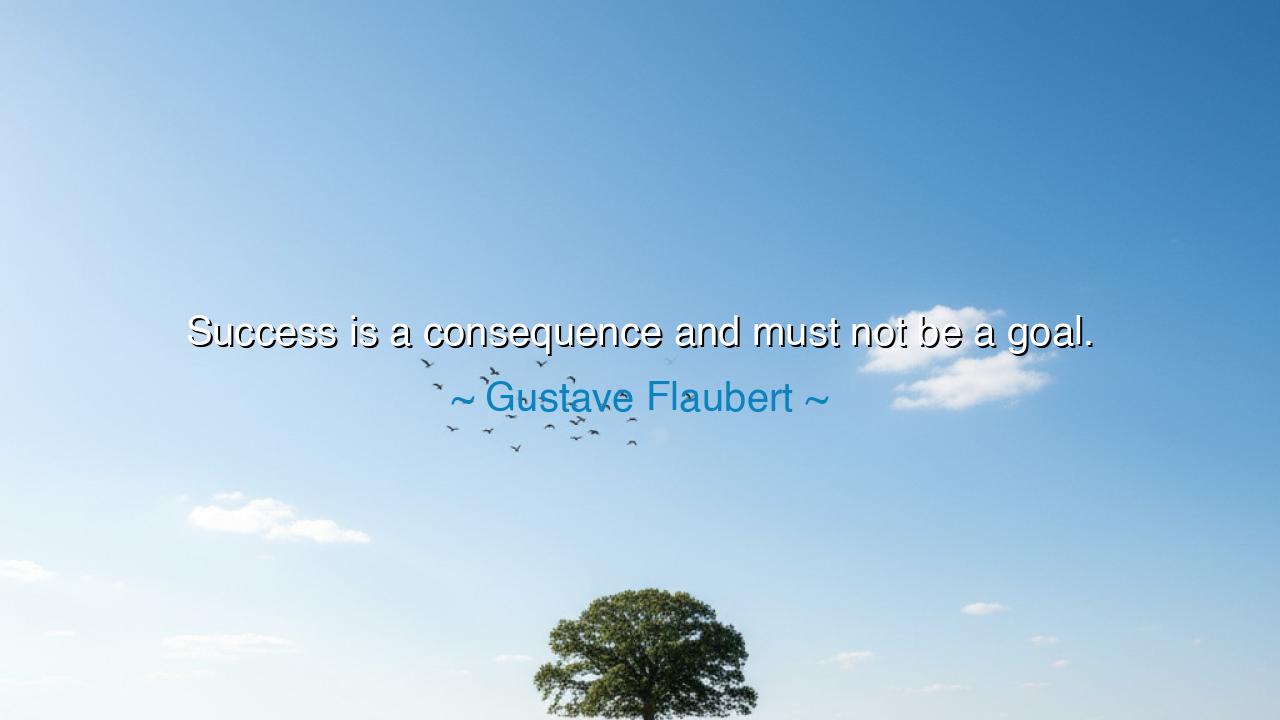
Success is a consequence and must not be a goal.






When Gustave Flaubert proclaimed, “Success is a consequence and must not be a goal,” he was not dismissing the glory of triumph, but pointing us toward the deeper foundation of a life well-lived. His words remind us that success is not an object to be hunted, but a shadow that follows when one pursues truth, craft, and virtue with devotion. Those who make success their idol grasp at air, but those who make excellence their path find that success comes unbidden, like fruit ripening on a well-tended tree.
The ancients knew this principle. The Stoics taught that one must never seek fame or wealth directly, for these lie outside our control. What can be controlled is the pursuit of virtue, discipline, and wisdom. Consequences flow naturally from causes: the farmer who tills diligently will see harvest, the warrior who trains faithfully will be ready for battle. To chase the harvest without tending the soil is folly; to chase the laurel without fighting the fight is vanity. Flaubert’s wisdom rests on this eternal law of cause and effect: let the goal be mastery, and let success arrive as its natural result.
Consider the life of Michelangelo. Had he labored for glory alone, his works might have been shallow imitations meant to please his patrons. Yet he sought perfection in craft above all else, carving as though every stroke of the chisel were communion with eternity. His reward was that success pursued him: the Sistine Chapel, the David, the Pietà. These were not born of ambition for fame, but of reverence for art. His glory was consequence, not goal.
There is danger in reversing this order. Many who have sought success as a goal alone have found only emptiness when they reached it. The conqueror who stands over a ruined city often feels the hollowness of his crown. The politician who chases power for its own sake discovers that victory without principle is ash. Even the merchant who lives only for riches finds himself imprisoned by them, for wealth pursued without purpose brings no peace. Success, when made a goal, devours its seeker.
Flaubert himself, a writer devoted to his craft, was relentless in precision. He pursued the perfect sentence, the exact word, the purity of expression. Fame was not his compass; truth in art was. Yet because of this devotion, the world remembers him. He illustrates his own maxim: he did not seek success, but it followed him across centuries as the consequence of fidelity to his work.
The lesson for us is clear: we must anchor our lives not in the pursuit of outcomes, but in the pursuit of excellence. If you are an artist, seek honesty in your work. If you are a student, pursue knowledge for its own sake. If you are a leader, strive for justice rather than acclaim. Let success come if it will, but do not let it be the star that guides your steps. True fulfillment lies in devotion to what is worthy, not in applause.
Practically, this means setting goals that are within your control: effort, discipline, integrity. Measure yourself not by the trophies you gather, but by the sincerity with which you labor. When you rise in the morning, do not ask, “How may I be successful?” but “How may I be excellent in my duty today?” In this way, you free yourself from the chains of vanity and walk the path of peace, knowing that the fruits of your labor will come in their own time.
Thus, Flaubert’s words endure like a beacon: success is a consequence, not a goal. To chase it is to run forever in circles. To forget it, and instead to walk with devotion, is to find it waiting for you at journey’s end. Let your eyes be fixed not on the shadow, but on the flame that casts it—and in so doing, you will achieve a greatness deeper than success: you will achieve a life of meaning.






AAdministratorAdministrator
Welcome, honored guests. Please leave a comment, we will respond soon